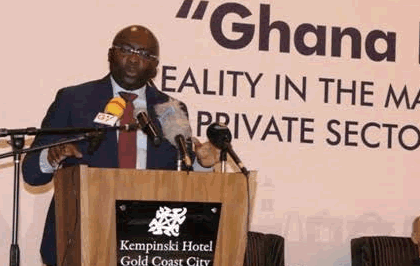Government to mobilise to close infrastructure gap – Bawumia

Vice President Dr Mahamudu Bawumia, on Monday, said government would mobilise domestic and regional resources to close the infrastructure gap and other national needs in view of the dwindling overseas development aid to Ghana.
He said sourcing international aid had become volatile because taxpayers of development partners had become apprehensive to continuing providing aid to the country and other African countries.
Vice President Bawumia said this in a keynote address delivered at the “Ghana beyond Aid” Conference organised by the Embassies of Denmark, the Netherlands and Norway, in partnership with the Ministry of Trade and Industry and Ghana Investment Promotion Centre in Accra.
He therefore urged Ghana and other African countries to instead pursue trade and partnerships as well as leveraging the resources of the private sector to accelerate economic growth.
Ghana beyond aid, the Vice President explained meant mobilising and leveraging domestic resources and revenues and transparently expanding financial inclusion, public services and private financing through local markets and currencies for development.
“It means investing in people and building the capacity of the next generation including access to quality education, training and jobs and building their overall capacity for innovation and knowledge, encouraging entrepreneurship, businesses, investing in infrastructure as basis for future productivity and public-private partnerships as well as building connectivity for data to share information,” he said.
The forum is aimed at leveraging the private sector and entrepreneurship as the main engines for economic growth.
It also aims at assessing the commitment of the government and other development partners, to move from “aid to trade”, examine lessons learnt from private sector partnerships and future steps that should be taken towards moving Ghana beyond aid and thus, make the country the most business-friendly nation in Africa.
Vice President Bawumia said government, this year, had rolled out policy interventions to enhance financial inclusion of the national economy, improved macroeconomic stability and fiscal discipline and debt sustainability in view of the lack of fiscal space for borrowing.
He noted that government was investing in physical and digital infrastructure such as the National Digital Addressing System, National Identification System and Interoperability of the payment system, as well as ensuring electronic procurement and paperless port processes.
This, he said, would ensure reliable data for both government and private institutions, improve public service delivery and enhance government’s revenue mobilisation drive.
The Vice President said, under the “Planting for Food and Jobs” initiative, the government would enhance the country’s agricultural production capacity with quality seedling, fertilizers and mechanised infrastructure for the country to reduce its food importation estimated at two billion dollars a year.
Touching on the country’s industrialisation drive, Vice President Bawumia said, it was time the country added value to its agricultural produce through agro-processing and indicated that, Ghana was collaborating with La Cote d’Ivoire, the two largest producers of the world’s cocoa beans, in order to maximise profit.
He said government would set up a Bauxite Development Authority that would facilitate the establishment of an Aluminum Refinery to process about 900 million metric tonnes of its bauxite reserves, adding that, Ghana stood the chance of raking-in about $450 billion dollars from it.
For the industrialisation agenda to succeed, he said, there was the need for available and affordable energy and gave the assurance that government was on course in achieving that objective.
On corruption, Dr Bawumia said the Nana Addo Dankwa Akufo-Addo led government was determined to improving transparency in public procurement processes and all the ministries, department and agencies as well as metropolitan, municipal and district assemblies were being enrolled onto an electronic platform, in order to avoid waste of public funds.
The system, he said would also ensure value for money in implementing government projects.
He noted that the Free Senior High School Policy was one of the objectives of government to build the human resource capacity and urged all stakeholders to support the government initiatives to accelerate national development.
The Denmark Ambassador to Ghana, Ms Tove Degnbol, who presented a document containing the 25 years of bilateral co-operation with Ghana to the Vice President, assured her country’s commitment to support Ghana’s efforts towards industrialisation, exploring investment opportunities and poverty alleviation.
Source: GNA
